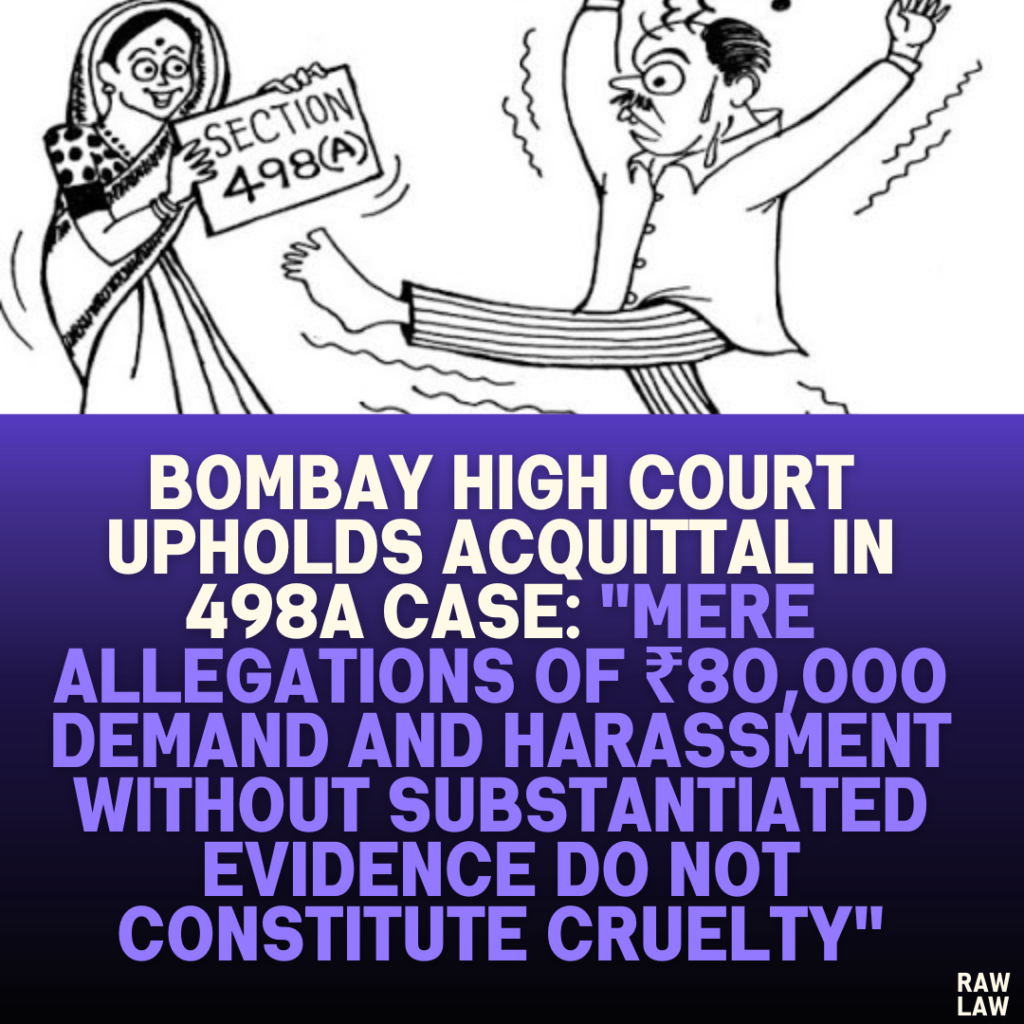Court’s Decision
The Bombay High Court dismissed the State’s appeal challenging the trial court’s acquittal of the accused under Sections 498A, 323, and 504 read with Section 34 of the Indian Penal Code (IPC). The court affirmed that the prosecution failed to establish the charges beyond reasonable doubt and observed that mere allegations of harassment or demand for money without supporting evidence cannot be classified as cruelty under Section 498A.
Facts
The case arose from allegations made by the complainant, who was married to Respondent No. 1 on June 25, 2001, in an arranged marriage. According to the complainant:
- Shortly after the marriage, in July 2001, she was assaulted and a demand of ₹80,000 was made by her in-laws to cover wedding expenses.
- She claimed additional instances of harassment in September 2001, including being assaulted for not cooking properly and for other reasons.
- Further harassment allegedly occurred in December 2001, when she stated that another demand for ₹80,000 was made, and she was assaulted and ill-treated.
- On December 25, 2001, the complainant left her matrimonial home and lodged a First Information Report (FIR) on December 26, 2001.
The accused included her husband (Respondent No. 1), her mother-in-law, her father-in-law (now deceased), her brother-in-law, and her brother-in-law’s wife. The complainant alleged that the actions of these individuals amounted to cruelty under Section 498A IPC.
Issues
- Whether the alleged demands for money and incidents of assault constituted cruelty under Section 498A IPC.
- Whether the prosecution’s evidence was sufficient to prove the charges beyond a reasonable doubt.
Petitioner’s Arguments
The State argued that:
- The trial court failed to consider the complainant’s testimony and the seriousness of the allegations made against the respondents.
- The evidence presented by the prosecution was sufficient to convict the accused.
Respondent’s Arguments
The respondents contended that:
- The complainant’s allegations were unsubstantiated and vague, lacking essential details about the specific incidents.
- In her cross-examination, the complainant admitted that her brother-in-law and his wife (Respondents 4 and 5) lived separately and had no involvement in the alleged harassment.
- The complainant’s testimony contradicted itself and failed to provide any corroborative evidence, such as medical records or statements from independent witnesses.
Analysis of the Law
The court referred to Section 498A IPC, which defines cruelty as:
- Harassment to coerce a woman or her relatives to meet unlawful demands.
- Conduct likely to drive a woman to suicide or cause grave injury or harm to her mental or physical health.
The court emphasized the necessity of clear evidence to prove harassment or cruelty and cited the explanation (b) to Section 498A, which distinguishes mere harassment or demand from legally recognized cruelty.
Precedent Analysis
The court relied on Ravindra Pyarelal Bidlan & Ors. v. State of Maharashtra (1993 Cri.L.J. 1309), which held that:
- Mere harassment or a demand for property does not constitute cruelty under Section 498A unless it is accompanied by clear evidence of intent to coerce or harm the complainant.
This precedent was instrumental in the court’s reasoning, as the complainant’s testimony failed to meet the required threshold for establishing cruelty.
Court’s Reasoning
The court found several deficiencies in the prosecution’s case:
- Contradictions in Testimony:
- The complainant admitted during cross-examination that her brother-in-law and his wife lived separately and had not quarreled with her.
- She also admitted that neither she nor her parents had reported these incidents to the police before lodging the FIR.
- Lack of Corroborative Evidence:
- The complainant’s allegations of assault and harassment were not supported by medical evidence or independent witness testimony.
- The complainant’s elder sister, who was allegedly aware of the harassment, did not testify, and her statement was not recorded.
- Generalized Allegations:
- The complainant’s statements about demands for ₹80,000 were vague, with no specifics about who made the demands or the circumstances in which they were made.
- Efforts for Reconciliation:
- Efforts to reconcile the differences between the complainant and her husband were made but were unsuccessful. This suggested that the allegations were not substantiated by strong evidence.
- Observations on Evidence:
- The evidence of other prosecution witnesses, including the complainant’s father and the investigating officer, did not provide any additional support for the complainant’s claims.
Conclusion
The court concluded that the prosecution failed to prove the charges beyond a reasonable doubt. The allegations of harassment and demand were unsubstantiated, and the complainant’s own testimony raised significant doubts about the veracity of her claims. Consequently, the appeal was dismissed, and the trial court’s judgment of acquittal was upheld.
Implications
This judgment reiterates the principles of due process and the need for substantive evidence in criminal cases. It serves as a reminder that:
- Mere allegations of harassment or demand for money, without evidence of coercion or harm, do not satisfy the legal definition of cruelty under Section 498A IPC.
- Courts must rely on concrete evidence and not on generalized or unsupported accusations.
The decision protects individuals from unfounded allegations while emphasizing the importance of a fair trial and the necessity for complainants to provide clear, specific, and corroborated evidence.
